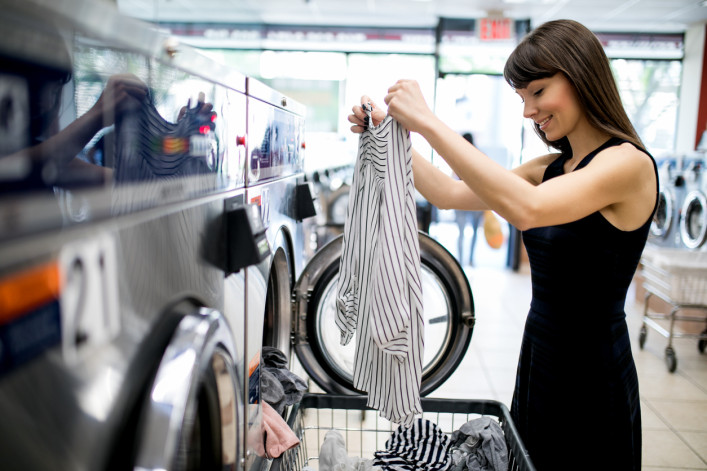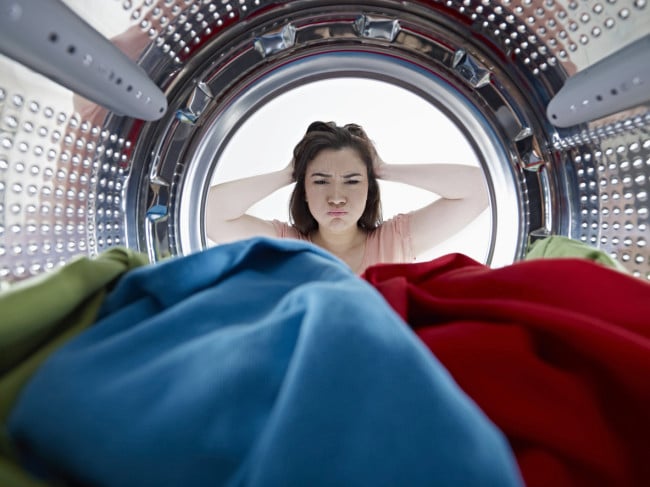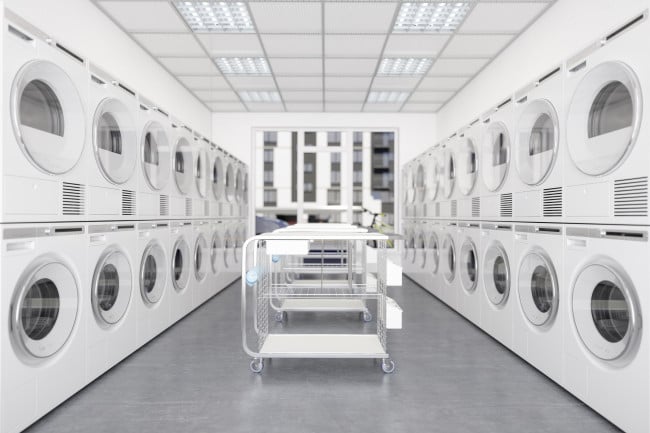Why I love my NYC laundromat: It’s large, well-run, and right around the corner
- The author doesn’t have a washer-dryer of her own and doesn’t pine for one either
- Access to large capacity machines makes doing the wash less of a chore
- Doing laundry outside your building prevents problems with your neighbors

Using a laundromat means schlepping your clothes back and forth, but to one New Yorker, it is worth it.
iStock
I know that a washer-dryer is the Holy Grail of apartment living, but give me a laundromat any day. Let me tell you how I came to that unorthodox (at least for New York City) opinion.
Like many city-dwellers, I’ve lived in several rental apartments that lack laundry machines in the unit or in the building. So I’m very familiar with all the headaches of relying on a laundromat. You can’t do laundry whenever at any hour you want. You have to make a plan to schlep it back and forth. And you can’t freak out when the cat pees on something at night when the laundromat is closed.
And yet, those truths don’t make me want a washer-dryer of my own. Never having had a washer-dryer in my apartment, I can’t speak to its awesomeness—but living in NYC is a tradeoff, and I am fine not having my own washer-dryer. One big reason is that I happen to have a great laundromat nearby.
And because of that, the disadvantages of a washer-dryer outweigh the advantages. My own machines could flood or catch fire. They could break. Apartment-size machines tend not to work well or handle large loads. And the most significant reason: The machines consume space. We don’t have that.
A week’s worth of laundry at once
One acquaintance—with a husband and two children—told me she was glad to move from an apartment with a washer-dryer to a big building with a big laundry room. Previously, the machines were running constantly. The dryer took hours. The ConEd bill was high. She heard horror stories about leaks from washing machines on high floors that flooded a dozen or more apartments below.
It was far easier, in their new place, to have the housekeeper take several loads at a time to the building’s laundry room and do the week’s laundry in one fell swoop.
Large machines can handle big, bulky items
We don’t have a housekeeper and we don’t have a laundry room. But we do have Soap One right around the corner.
Maybe I have a particularly lucky laundromat situation. Our laundromat is so close that I can easily make two trips if I have a few heavy loads. And it’s nice—clean, bright, and big, so there’s plenty of room to maneuver without bumping into other people also doing their laundry.
The place is run by a Chinese family of four, and someone is always there if you need something, like change for a $20 bill in order to feed the change machine. When it’s really busy, with the laundry staff working on other people’s drop-off laundry, the staff monitors the machines so the do-it-yourselfers have priority.
The machines work well, too, with a choice of hot, warm, or cold; extra wash or extra rinse; delicates or blankets. There are some bigger machines plus one jumbo machine that fits enormous things, like our queen-size down comforter.
The downsides of relying on a laundromat
The only real flaw of my laundromat is its limited hours—it closes at 7 p.m. And it has been known to close early on holiday evenings without warning. Once the gas on the block was out for a few days, so the place was out of commission.
Customers must feed the machines with quarters. The price rose recently from $3.75 to $4 for a regular load. The price of the dryers stayed the same—a quarter for four minutes. I wouldn’t mind being able to use a credit card, but I figure that the owner prefers to forgo the processing fee.
People generally use those wheeled wire carts to roll their wet laundry from washer to dryer, but I never do, since they don’t seem clean enough for me—I’m finicky that way. I’ve actually seen people line these carts with doggie pee pads. I prefer to carry stuff from the washer to the dryer. It usually takes five handfuls per load.
Other peoples’ dirty laundry
Sometimes I watch other customers, just like I peek into other people’s grocery carts. I’ve seen people use dishwashing liquid as laundry detergent, stuff a month’s worth of laundry into the jumbo machine, and mix lights and darks with abandon.
I also watch the wash-and-fold employees who work there. Laundry is a labor-intensive task. These women fold, smooth, and stack. They turn T-shirts inside out with a swift, two-handed motion. They are marvels at turning a fitted sheet into a perfect, neat bundle. I’ve also seen items accidentally drop or drag on the floor, which is another reason I prefer to do it myself.
Building laundry rooms can fall short
If people don’t have a washer-dryer, they often want a building laundry room, which is the next best thing—but not always. Some building laundry rooms are pretty bad, my friends tell me. They may have insufficient capacity for the building, causing a frustrating wait or even a confrontation with neighbors. The machines are sometimes broken. The dryers can sometimes run hot enough to singe the fabric.
I know someone who got locked inside her laundry room and had to call the super to let her out. One friend did a whole load in her building’s substandard laundry room, only to find the laundry pod still intact. After that, I started piercing my laundry pods with a safety pin, just in case.
When I took microeconomics in college, we learned about substitutability. You don’t miss Coke when you have Pepsi. Sometimes a substitute isn’t quite as good, but sometimes it’s better. I don’t miss a washer-dryer because I have my laundromat.
Annabel Lee (a pseudonym) is a long-time New Yorker.
You Might Also Like




























